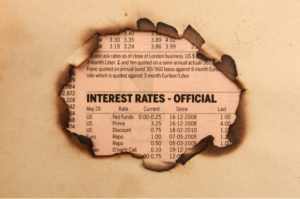
Gary Shilling warns against overpaying for stocks simply because rates are low. In piece for Bloomberg, he explains that investors “tend to be overly enthusiastic at business cycle peaks when corporate cash is plentiful and purchase their shares at high prices.” He writes:
U.S. stocks are expensive by historical standards, and the bulls try to justify current valuations by pointing to extremely low levels of interest rates. There are a number of reasons why that’s no reason to pay sky-high prices relative to profits.
With companies preparing to start reporting results for the third quarter, the S&P 500 Index is trading at 19.1 times earnings over the last 12 months, compared with the average of 16.9 over the long term. It should be noted that earnings per share in the past year have been supported by unsustainable stock buybacks. Corporate managements, though, generally have a buy high, sell low mentality. They tend to be overly enthusiastic at business cycle peaks when corporate cash is plentiful and purchase their shares at high prices.
Also, the 2017 corporate tax cut that reduced the top tax rate from 35% to 21% boosted cash flows. So has the lack of capital spending. Conversely, in recessions, when stocks are cheap, but earnings and cash flow are weak, buybacks are few and sometimes replaced by emergency stock issuance.
The cyclically-adjusted price-to-earnings, or CAPE, ratio is also high at 30.3, or 44% above its long-term average of 16.9. This P/E is calculated using real corporate earnings over the past 10 years to iron out short-term fluctuations. Except for 2008, that P/E has been above the long-run average since the early 1990s, so if the long-term number is still valid, the CAPE will be below 16.9 for a number of years in the future to return to trend. Some say that long-run average is no longer relevant, but as legendary investor Sir John Templeton said, “The most dangerous words in the English language are, it’s different this time.”
Read more here.



